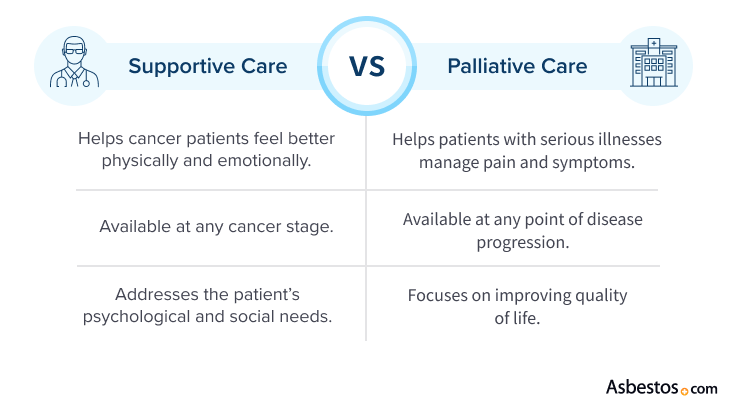Tami Pream decided to join a mesothelioma support group when her cancer returned. Another participant in the group discussed traveling while receiving treatment. “He’s going on cruises and doing all sorts of things, and he’s on his eleventh round of chemotherapy,” Tami says. “He’s still living his dreams and doing well. It was uplifting to listen to him.”
Mesothelioma Supportive Care
Mesothelioma supportive care includes treatments that help manage symptoms, improve comfort and enhance quality of life. Unlike curative therapies, supportive therapy for mesothelioma focuses on symptom relief, pain management and emotional well-being.

What Is Supportive Therapy for Mesothelioma?
Supportive therapy for mesothelioma makes it easier for people to cope. Mesothelioma can cause several difficult symptoms. Supportive care aims to make life easier and more comfortable.
Key Facts About Mesothelioma Supportive Care
- Supportive care can help you manage difficult symptoms.
- It provides emotional and mental health support for both you and your loved ones.
- Supportive care aims to address your physical, emotional and social needs.
Supportive care might involve medicine for pain, help with daily tasks or counseling. The goal is to help you live as full a life as possible, even while dealing with cancer. Every person’s experience with mesothelioma is different. Health providers tailor supportive care to each patient.
Supportive care is available at any stage of disease progression. Mesothelioma treatment guidelines recommend supportive therapies to help people through treatment and recovery.
Supportive Care vs. Palliative Care for Mesothelioma
After a mesothelioma diagnosis, you might hear about supportive care and palliative care. While they share some goals, there are some differences. Both aim to help you through treatment. But they focus on different things.
Supportive care is like a broad umbrella of help. The Multinational Association of Supportive Care in Cancer says supportive care is for the “prevention and management of the adverse effects of cancer and its treatment.” It seeks to improve life for those with mesothelioma, in both body and mind. This means helping with pain and tiredness. It also means supporting feelings like sadness and worry. Supportive care is available at any stage. This includes care for new diagnoses and more advanced cases. It also looks at a person’s physical and social needs.
Palliative care for mesothelioma focuses more on managing pain and relieving other symptoms. It improves quality of life, making someone feel more comfortable. Like supportive care, palliative care can be given at any point in the illness. Supportive care takes a broader approach and looks at the whole person.

Pain Management in Mesothelioma Supportive Care
Mesothelioma pain is a common challenge for patients. Supportive care focuses on managing this pain to help you live as comfortably and actively as possible. This usually means using different methods that fit your individual needs.
Pain Management Options
- Complementary Therapies: These can include things like massage, acupuncture or meditation. They can help ease your pain alongside other treatments.
- Medications: Over-the-counter options help with minor pain. Stronger options, like opioids, offer greater pain relief.
- Procedures: Doctors might use nerve blocks or injections to target specific pain.
- Psychological and Emotional Support: Dealing with pain can be tough emotionally. Counseling and support groups can help you cope and reduce stress.
- Radiation Therapy: It can shrink tumors, which can help lessen pain from tumor growth.
Pain management is important at every stage of mesothelioma. It can help manage pain from the cancer and treatment side effects. As mesothelioma progresses, pain management might become the focus of care.
Supportive Care for Mesothelioma Breathing Issues
Mesothelioma causes progressive breathing problems. Supportive care helps you breathe better and enhances quality of life. The approach focuses on managing symptoms and providing personalized care.
This might involve different therapies and working with a team of health care professionals. The goal is to help you breathe easier.
Breathing Support Options
- Oxygen Therapy: This gives extra oxygen using a mask or nasal tubes. It can help when blood oxygen levels are low.
- Pulmonary Rehab: Exercises and education can boost breathing muscles and enhance lung function. Respiratory therapy for mesothelioma is available at all stages.
- Medications: Prescribed medications can open airways, reduce inflammation or manage other breathing-related issues.
- Procedures: Certain procedures can remove fluid buildup, called pleural effusion, or open blocked airways.
These therapies are often available in hospitals, cancer centers and specialized clinics. You can talk to your doctor about which options might be best for you.
A team of health professionals can provide these treatments and support. Examples include doctors, nurses, respiratory therapists and physical therapists. They work together to create a plan that meets your specific needs.
Nutrition in Mesothelioma Supportive Therapy
Eating well is important for people undergoing mesothelioma treatment. Good nutrition can help you stay strong and manage the side effects of treatment.
A high-protein diet is often recommended to help maintain muscle strength. Prioritizing nutrition can boost energy, improve overall well-being and enhance your treatment tolerance.
Nutrition Tips for Mesothelioma Patients
- Hydration: Drinking plenty of fluids is important to stay hydrated, especially during treatment.
- Healthy Fats: Including healthy fats can provide energy and support health. Examples include avocados and nuts.
- High-Protein Diet: Eating enough protein helps keep your muscles strong. This is very important during cancer treatment.
- Nutrient-Rich Foods: Eating fruits, vegetables and whole grains provides vitamins and minerals.
- Small, Frequent Meals: Eating smaller meals more often can help. This is especially true if you’re experiencing nausea or other side effects.
“Try to remember to eat small, frequent meals,” says registered and licensed dietitian Tejal Parekh. “Instead of eating 3 large meals a day, break your meals up into perhaps 5 or 6 smaller meals.”
A registered dietitian can make a mesothelioma nutrition plan specifically for you. This plan helps prevent malnutrition and weight loss. They can offer tips on how to manage side effects like nausea or loss of appetite.

Emotional Support and Mental Health in Mesothelioma Care
Coping with a mesothelioma diagnosis can bring emotional challenges, not just physical ones. It’s common to experience a range of emotions. Anxiety, depression or even anger are normal.
These feelings are a normal response to dealing with a difficult health situation. Taking care of your emotional health is as important as other medical care. Seeking emotional and mental health support is a sign of strength. It can make a big difference in navigating the challenges of mesothelioma.
Support Options for People With Mesothelioma
- Mind and Body Techniques: These can help reduce stress and promote relaxation. Examples include meditation, progressive relaxation exercises and yoga.
- Support Groups: Connecting with others who understand what you’re going through helps. Support groups offer a safe space to share experiences and learn from each other.
- Therapy: Talking with a therapist or counselor can provide emotional support. They can help you develop coping strategies.
These mesothelioma support options are available in hospitals, cancer centers and community organizations. Many mind and body techniques can be learned through classes or online resources.
“Relaxation activities align the mind with the body,” says counselor Dana Nolan. “These exercises may improve mood, sleep and physical mesothelioma symptoms like pain.”
Integrative and Complementary Supportive Therapies for Mesothelioma
A serious illness like mesothelioma leads many people to consider other options. That’s where complementary and integrative therapies come in.
Integrative oncology unites complementary therapies with standard treatments like chemo or radiation. These therapies aren’t meant to replace standard cancer treatment. Alternative therapies, however, are neither proven nor doctor recommended. They’re used instead of standard treatment.
Complementary Therapies in Supportive Care for Mesothelioma
- Acupuncture: Thin needles go into certain body points. Many people find this helps with pain and other symptoms.
- Exercise: Gentle exercise can help improve strength, flexibility and well-being.
- Herbs and Supplements: Some people use herbs and supplements. But it’s crucial to talk to your doctor first. Some can interfere with cancer treatment or have harmful side effects.
- Massage Therapy: A therapist uses various techniques to work on muscles and tissues. This can help reduce pain, stress and anxiety.
- Relaxation Techniques: These practices include deep breathing, meditation and guided imagery. They can help calm both your mind and body.
Some cancer centers have integrative oncology programs. These programs can help you choose the safest therapies. They coordinate standard cancer treatments with complementary mesothelioma therapies.
The goal is to address not just the physical disease. They also address your emotional, mental and spiritual well-being. Talk to your doctor before starting any new therapy. This helps ensure it’s safe and won’t conflict with your cancer treatment.
Mesothelioma Supportive Care Team
A mesothelioma supportive care team includes various health care professionals. They’ll work together to assist you and your family. This team might include doctors, nurses, dietitians, therapists and social workers. Mesothelioma caregivers play a vital role on the team. They’re usually family or close friends. Everyone works together to provide the best possible care.
“People who are taking care of mesothelioma patients also play a vital role and shouldn’t be forgotten,” mesothelioma survivor Kevin Hession tells us. “Mesothelioma caregivers are going to have good days and bad days just like I’m going to have good days and bad days. You have to take care of the caregivers.”
Caregiver Tips
- Caregiver Burnout: Recognizing caregiver burnout is important so caregivers can seek help. Examples include exhaustion and irritability.
- Respite Care: This gives caregivers a break, providing temporary patient care.
- Stress Reduction: It’s important to find healthy ways to manage stress. Exercise and relaxation techniques can help.
- Support Groups: Connecting with other caregivers can provide emotional support and practical advice.
Coordinating care between all members of the supportive care team is essential. It involves keeping each member aware of the medical care you’ll receive.
A coordinated approach helps the team give you the best care possible. This helps you and your family get great support.

Accessing Mesothelioma Supportive Care Services
Getting the support you need is crucial when dealing with mesothelioma. Patient advocates can be a huge help in this process.
They’re like guides who can connect you with a variety of resources. They find the right doctors and financial help for you. They can also help you find clinical trials and navigate the health care system.
Where to Find Support
- Cancer Centers: Many cancer centers have special departments for supportive care. They provide various services all in one location. Some mesothelioma treatment centers integrate these services into a treatment plan.
- Hospitals: They usually have social workers, counselors and other experts. They can help you find support resources.
- Patient Advocates: They can help you find support services, financial aid and legal advice. They also connect you with other patients and families.
- Support Groups: Meeting others who share your experiences can boost your mental health.
Supportive care professionals offer support for managing symptoms, emotional well-being and financial advice. Their goal is to care for the whole person. Patient Advocates at The Mesothelioma Center, for example, can connect you with the best supportive care providers in your area.
Recommended Reading


